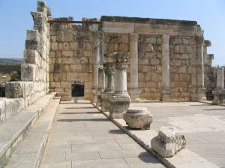 Reprinted with permission from As I See It, which is available free by writing to the editor at dkutilek@juno.com. Read the series so far.
Reprinted with permission from As I See It, which is available free by writing to the editor at dkutilek@juno.com. Read the series so far.
Chapter Six: Officers in the Synagogue and the Church
Officers in the Synagogue
The classes of officers in the synagogue as reported in the NT are three in number, namely, “rulers of the synagogue,” “elders,” and “attendants.” The offices as related in the Mishnah include these three, but also others.
Ruler of the Synagogue
The Gospels mention two men who are identified as “ruler of the synagogue” (archisunagogos): Jairus (Mark 5:22, 35, 36, 38; Luke 8:49) and an unnamed individual who rebuked Jesus for healing on the Sabbath. Mark calls Jairus archisunagogos four times, while Luke does so once; Matthew in his parallel account does not do so at all. When first introducing Jairus, Luke does use the virtually identical term “ruler of the synagogue” (archon tes sunagoges, 8:41) which is simply the same Greek elements not combined into a compound word. Matthew refers to him simply as “ruler” (archon, Matthew 9:19, 23), making no specific mention of any connection to the synagogue. It is of note that Mark identifies Jairus as “one of the rulers of the synagogue” (Mark 5:22), which suggests or at least allows for a plurality of such rulers within a single congregation.



 Reprinted with permission from
Reprinted with permission from 
Discussion